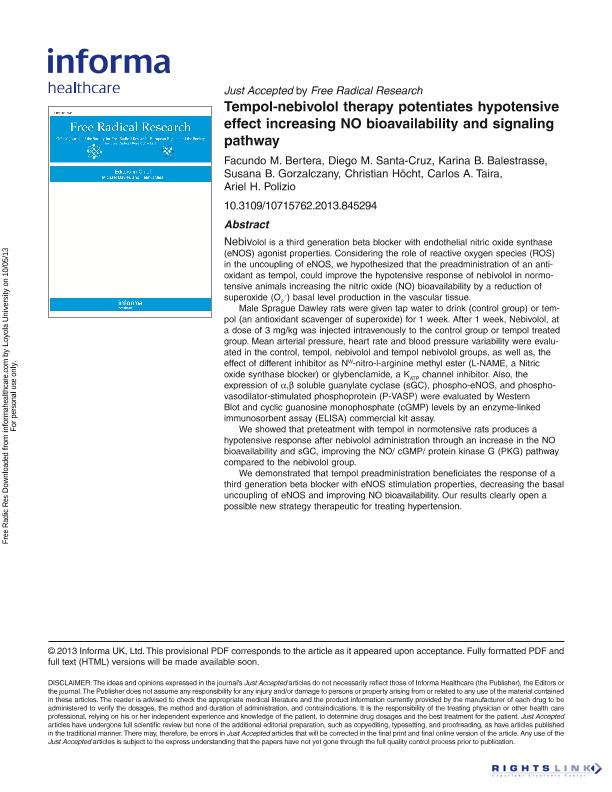Mostrar el registro sencillo del ítem
dc.contributor.author
Bertera, Facundo Martin

dc.contributor.author
Santa Cruz, Diego Mario

dc.contributor.author
Balestrasse, Karina Beatriz

dc.contributor.author
Gorzalczany, Susana Beatriz

dc.contributor.author
Höcht, Christian

dc.contributor.author
Taira, Carlos Alberto

dc.contributor.author
Polizio, Ariel Héctor

dc.date.available
2017-05-15T21:06:11Z
dc.date.issued
2014-02
dc.identifier.citation
Bertera, Facundo Martin; Santa Cruz, Diego Mario; Balestrasse, Karina Beatriz; Gorzalczany, Susana Beatriz; Höcht, Christian; et al.; Tempol-nebivolol therapy potentiates hypotensive effect increasing NO bioavailability and signaling pathway; Taylor & Francis; Free Radical Research; 48; 2; 2-2014; 109-118
dc.identifier.issn
1071-5762
dc.identifier.uri
http://hdl.handle.net/11336/16510
dc.description.abstract
Nebivolol is a third generation beta blocker with endothelial nitric oxide synthase (eNOS) agonist properties. Considering the role of reactive oxygen species (ROS) in the uncoupling of eNOS, we hypothesized that the preadministration of an antioxidant as tempol, could improve the hypotensive response of nebivolol in normotensive animals increasing the nitric oxide (NO) bioavailability by a reduction of superoxide (O2•−) basal level production in the vascular tissue. Male Sprague Dawley rats were given tap water to drink (control group) or tempol (an antioxidant scavenger of superoxide) for 1 week. After 1 week, Nebivolol, at a dose of 3 mg/kg, was injected intravenously to the control group or to the tempol-treated group. Mean arterial pressure, heart rate, and blood pressure variability were evaluated in the control, tempol, nebivolol, and tempol nebivolol groups, as well as, the effect of different inhibitor as Nβ-nitro-l-arginine methyl ester (L-NAME, a Nitric oxide synthase blocker) or glybenclamide, a KATP channel inhibitor. Also, the expression of α,β soluble guanylate cyclase (sGC), phospho-eNOS, and phospho-vasodilator-stimulated phosphoprotein (P-VASP) were evaluated by Western Blot and cyclic guanosine monophosphate (cGMP) levels by an enzyme-linked immunosorbent assay (ELISA) commercial kit assay. We showed that pretreatment with tempol in normotensive rats produces a hypotensive response after nebivolol administration through an increase in the NO bioavailability and sGC, improving the NO/cGMP/protein kinase G (PKG) pathway compared to that of the nebivolol group. We demonstrated that tempol preadministration beneficiates the response of a third-generation beta blocker with eNOS stimulation properties, decreasing the basal uncoupling of eNOS, and improving NO bioavailability. Our results clearly open a possible new strategy therapeutic for treating hypertension.
dc.format
application/pdf
dc.language.iso
eng
dc.publisher
Taylor & Francis

dc.rights
info:eu-repo/semantics/openAccess
dc.rights.uri
https://creativecommons.org/licenses/by-nc-sa/2.5/ar/
dc.subject
Antioxidants
dc.subject
Cardiovascular Therapeutic
dc.subject
Nitric Oxide
dc.subject
Oxidative Stress
dc.subject
Endothelial Nitric Oxide
dc.subject
Third Generation Beta Blockers
dc.subject.classification
Farmacología y Farmacia

dc.subject.classification
Medicina Básica

dc.subject.classification
CIENCIAS MÉDICAS Y DE LA SALUD

dc.title
Tempol-nebivolol therapy potentiates hypotensive effect increasing NO bioavailability and signaling pathway
dc.type
info:eu-repo/semantics/article
dc.type
info:ar-repo/semantics/artículo
dc.type
info:eu-repo/semantics/publishedVersion
dc.date.updated
2017-05-15T14:45:12Z
dc.journal.volume
48
dc.journal.number
2
dc.journal.pagination
109-118
dc.journal.pais
Reino Unido

dc.journal.ciudad
Londres
dc.description.fil
Fil: Bertera, Facundo Martin. Universidad de Buenos Aires. Facultad de Farmacia y Bioquímica. Departamento de Farmacología; Argentina
dc.description.fil
Fil: Santa Cruz, Diego Mario. Universidad de Buenos Aires. Facultad de Farmacia y Bioquímica; Argentina. Consejo Nacional de Investigaciones Científicas y Técnicas; Argentina
dc.description.fil
Fil: Balestrasse, Karina Beatriz. Universidad de Buenos Aires. Facultad de Farmacia y Bioquímica; Argentina. Consejo Nacional de Investigaciones Científicas y Técnicas; Argentina
dc.description.fil
Fil: Gorzalczany, Susana Beatriz. Universidad de Buenos Aires. Facultad de Farmacia y Bioquímica. Departamento de Farmacología. Cátedra de Farmacología; Argentina. Consejo Nacional de Investigaciones Científicas y Técnicas; Argentina
dc.description.fil
Fil: Höcht, Christian. Universidad de Buenos Aires. Facultad de Farmacia y Bioquímica. Departamento de Farmacología. Cátedra de Farmacología; Argentina
dc.description.fil
Fil: Taira, Carlos Alberto. Universidad de Buenos Aires. Facultad de Farmacia y Bioquímica. Departamento de Farmacología. Cátedra de Farmacología; Argentina. Consejo Nacional de Investigaciones Científicas y Técnicas; Argentina
dc.description.fil
Fil: Polizio, Ariel Héctor. Universidad de Buenos Aires. Facultad de Farmacia y Bioquímica. Departamento de Farmacología. Cátedra de Farmacología; Argentina. Consejo Nacional de Investigaciones Científicas y Técnicas; Argentina
dc.journal.title
Free Radical Research

dc.relation.alternativeid
info:eu-repo/semantics/altIdentifier/url/http://www.tandfonline.com/doi/abs/10.3109/10715762.2013.845294?journalCode=ifra20
dc.relation.alternativeid
info:eu-repo/semantics/altIdentifier/doi/http://dx.doi.org/10.3109/10715762.2013.845294
Archivos asociados
